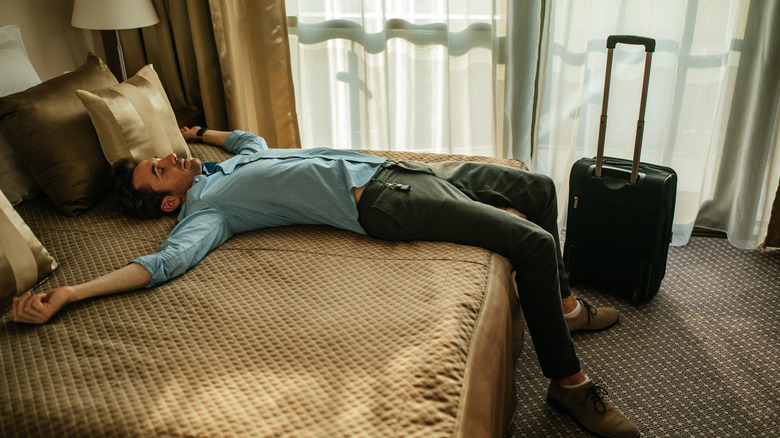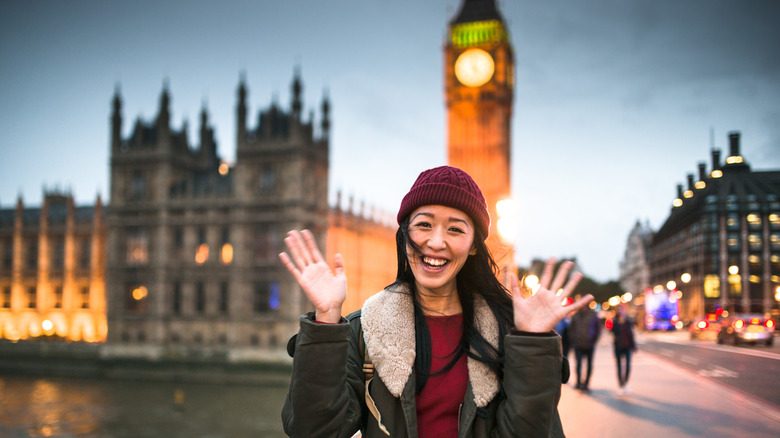The Unusual Tip You May Want To Try That Makes Jetlag Easier To Deal With
Jet lag is one of the few downsides when it comes to travel, and it's a nuisance that almost everyone experiences the moment they arrive in a new time zone. Jet lag is the condition that arises when your body's natural circadian rhythm doesn't match up to the local time at your travel destination, and it affects everyone differently. For some, the symptoms are barely noticeable, while for others, it's pretty debilitating and can ruin an otherwise fantastic vacation.
For most travelers, you'll feel jet lag the most during the first few days of your trip — it lasts about a day for every 1.5 hours of time difference. There are plenty of tips on combating jet lag, like avoiding caffeine and alcohol, to manage symptoms, but they aren't a cure-all. While you may be able to help prevent jet lag with some lifestyle choices, most travelers conclude that there really isn't any way to completely rid yourself of pesky jet lag symptoms, no matter how hard you try. There is no actual cure. Instead, the best way to deal with jet lag might be to make the best of it until it subsides. With proper planning, you can use jet lag to your advantage.
When traveling east, stay up late
If you're traveling east, you will be losing time. When planning the first few days of your trip east, consider the time difference between your city of origin and your chosen destination. Plan your schedule accordingly so that you can embrace jet lag and make the most of it. Let's say you're a New Yorker traveling to London as an example, and consider that London is five hours ahead of your usual time zone. If you're used to waking up at 8 a.m. at home, your body will want to sleep in until 1 p.m. in London. Forcing yourself to wake up at 8 a.m. London time will feel like waking up at 3 a.m. at home, which can leave you feeling exhausted.
Instead of pushing through, stack your itinerary with afternoon and evening activities, and give yourself time to sleep in for the first few days. Hit the town and spend some time experiencing the local nightlife, or book fun night tours to take in the city lights. Consider planning a special dinner out at a highly-rated local restaurant. Browse local event calendars for concerts, theater, or other live performances. Many cities come alive at night, and some of the best experiences can happen after the sun sets, so take advantage of your ability to stay up late. Save those early morning excursions for a little later in your trip once the jet lag subsides.
When traveling west, wake up early
When you travel west, you will gain time. Many travelers claim that their jet lag is worse when they travel east, as it is harder for the body to adjust to the lost time. Traveling west is often preferred because it's easier to stay awake at the end of the day than to wake up earlier and function when your body is used to being sound asleep.
If you're traveling from London to New York City, you'll have an additional five hours to indulge in all the amazing activities the city has to offer. Suppose you're scheduled to arrive at 5 p.m. London time. In that case, you'll reach New York City at noon, giving you an entire day to explore. However, you may start feeling sleepy by the early evening hours, so consider adding a buffer day before any late-night festivities.
When traveling West, you'll likely wake up ready to hit the ground running, so stack your schedule with plenty of morning activities. If you rouse before your alarm, you can use the extra time to squeeze in a workout, hit the hotel breakfast buffet before it gets picked over, or take a relaxing morning walk to get a feel for your surroundings before the rest of the city wakes up. A huge perk of jet lag is that you can beat the crowds by heading to the most popular tourist attractions as soon as they open — you may even have them all to yourself.


